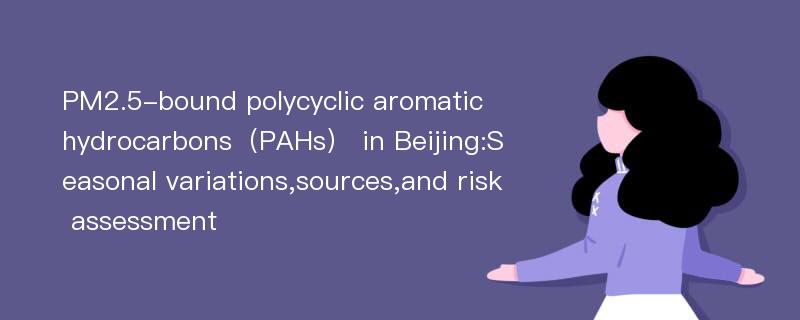
论文摘要
Polycyclic aromatic hydrocarbons(PAHs) have been of health concern due to its carcinogenesis and mutagenesis. In this study, we aimed to assess the variations, sources, and lifetime excessive cancer risk(ECR) attributable to PAHs bound to ambient particulate matters with aerodynamic diameter less than 2.5 μm(PM2.5) in metropolitan Beijing, China. We collected24-hour integrated PM2.5 samples on daily basis between November 2014 and June 2015 across both central heating(cold months) and non-heating(warm months) seasons, and further analyzed the PAH components in these daily PM2.5 samples. Our results showed that total concentrations of PM2.5-bound PAHs varied between(88.6 ± 75.4) ng/m3 in the cold months and(11.0 ± 5.9) ng/m3 in the warm months. Benzo[a]pyrene(Ba P), the carcinogenic marker of PAHs,averaged at 5.7 and 0.4 ng/m3 in the cold and warm months, respectively. Source apportionment analyses illustrated that gasoline, biomass burning, diesel, coal combustion and cooking were the major contributors, accounting for 12.9%, 17.8%, 24.7%, 24.3% and 6.4% of PM2.5-bound PAHs, respectively. The BaP equivalent lifetime ECR from inhalation of PM2.5-bound PAHs was 16.2 cases per million habitants. Our results suggested that ambient particulate reduction from energy reconstruction and adaption of clean fuels would result in reductions PM2.5-bound PAHs and its associated cancer risks. However, as only particulate phased PAHs was analyzed in the present study, the concentration of ambient PAHs could be underestimated.
论文目录
文章来源
类型: 期刊论文
作者: Baihuan Feng,Lijuan Li,Hongbing Xu,Tong Wang,Rongshan Wu,Jie Chen,Yi Zhang,Shuo Liu,Steven Sai Hang Ho,Junji Cao,Wei Huang
来源: Journal of Environmental Sciences 2019年03期
年度: 2019
分类: 工程科技Ⅰ辑
专业: 环境科学与资源利用
单位: Department of Occupational and Environmental Health, Peking University School of Public Health,Key Laboratory of Molecular Cardiovascular Sciences of Ministry of Education, Peking University,Institute of Earth and Environment, Chinese Academy of Sciences
基金: supported by Beijing Natural Science Foundation(L150001),Peking University Health Science Center “100 Talent Young Investigator” Program,Peking University Infrastructure Fund for Clinical Research(2013-3-02)
分类号: X513;X820.4
页码: 11-19
总页数: 9
文件大小: 1310K
下载量: 102
